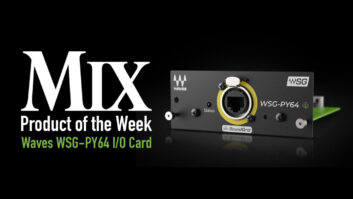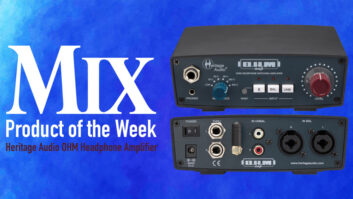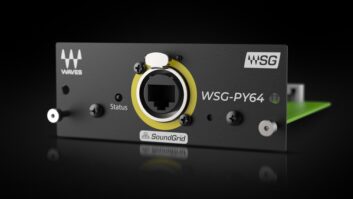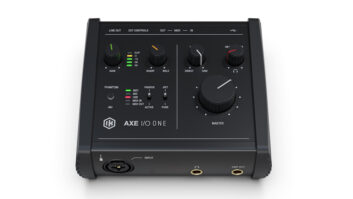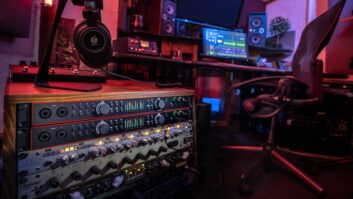Like busy train stations, digital audio I/O cards today shuttle more incoming and outbound tracks than ever before. Whether you’re riding the Toslink Overland, AES/EBU Bullet Train or Analog XLR Express, there’s a wealth of new cards to choose from when routing tracks into and out of any laptop- or minitower-based station.
If you’re looking for a new I/O card, we know there are a lot of options out there, so to make it easier for you, we’ve put together the following list of new or significantly upgraded I/O card packages released since Winter NAMM ’99. Information on bundled software, hardware and connectors is included, as is data about analog and digital I/O, sampling rate support, synchronization, driver updates, onboard synthesis, DSP effects, expansion options and more.
A few turnkey computer solutions are included here, but the majority of these audio I/O solutions for Mac and PC consist of a PCI computer card; a breakout box or cable bundle; and a collection of mixer, sequencer and/or audio utility software applications. Look for cards with SMPTE and VITC support for film and video work, digital inputs and outputs for lossless audio transfers, and dedicated onboard DSP to help you design the widest and most efficient audio “train station” your computer can handle.
Aardvark’s Aark 24 ($899) is a 24-bit solution for Windows 95/98 users. It offers eight 11/44-inch analog, RCA and Toslink S/PDIF, ADAT optical and word clock I/O connectors. Aark Direct ($425) comes with virtual mixing software, 2×2 11/44-inch and RCA analog and S/PDIF I/O, and an optional AES/EBU interface, all in a single rackspace. Aardvark’s Aark TDIF ($425) includes DSP processing, peak metering and eight channels of 24-bit TDIF audio. The Direct Pro 24/96 ($699) comes with a full complement of PC audio goodies: four XLR mic and four 11/44-inch inputs, six line outs, RCA S/PDIF connectors, three-stage input trim, and DSP effects that include compression, reverb and EQ algorithms.
Users can now plug all their ADAT tracks directly into a Mac or PC with Alesis’ ADAT/EDIT ($399) package. A PCI card, 3-meter ADAT optical cable and customized ADAT audio editing software are included, as are the ADAT/CONNECT audio transfer utility and .WAV, AIFF, ASIO and Sound Manager drivers.
Antex’s StudioCard 2000 Plus ($895) is an improved 24-bit/96kHz version of its now-discontinued StudioCard 2000. It routes two channels of AES/EBU and S/PDIF digital audio in addition to the existing 4×4 analog I/O interface. Bundled with the Plus is Samplitude Project multitracking software from SEK’D; an optional breakout connector box is available for $200.
Among many new Creamware products launched at the recent Frankfurt MusikMesse show were three new I/O card solutions: Luna 2496 DSP ($998), Pulsar II ($1,398) and Scope/SP Studio Pack ($4,695). The Luna is an expandable cross-platform system with an 8-channel rackmounted breakout box and three Analog Devices SHARC DSP chips that can be upgraded to provide more than 100 channels of 24/96 audio I/O. The Pulsar II now boasts S/TDM bus support, ASIO and EASI drivers, and six SHARCs that boost DSP power 50% over the original Pulsar card. Picking up where its predecessor left off is the Scope Studio Pack, a complete recording, synthesis, sampling, effects, mixing and mastering solution for Windows and Mac OS, with 15 SHARC chips that do a lot more than just reduce host CPU load.
Digidesign has released enough I/O options to satisfy any PC- or Mac-based audionaut. The flagship Pro Tools|24 MIXplus System (starting at $9,995), Digi ToolBox XP ($545) and 1622 I/O ($1,595) all debuted since Winter NAMM ’99, and the new 888/24 I/O Audio Interface ($3,695) and Digi 001 ($995) have been big releases, as well. The 888/24 provides eight channels of 24-bit analog and AES/EBU and S/PDIF digital I/O, supports Mac and Windows, and can operate as a stand-alone ADA converter. The entry-level Digi 001 system is plenty powerful, featuring eight analog inputs (two with built-in mic preamps), ADAT optical and coaxial S/PDIF digital I/O, separate monitor and headphone outputs, and it comes bundled with Pro Tools LE and a good collection of DigiRack plug-ins (AudioSuite and RTAS plug-in formats are also supported).
Until Digigram released its first professional PCMCIA audio I/O card, the tiny 11/48-inch micro jack inputs and dearth of PCI slots on laptop computers kept most engineers from taking computer-based recording very seriously. The new VXpocket V.2 ($729) adds linear timecode (LTC) SMPTE support and two balanced mono mic/line inputs to the original VXpocket. Digigram’s new VXpocket 440 ($1,069) goes up to 4×4 balanced XLR mic I/O configurable as four outputs, and the VX222 ($529) sports stereo XLR I/O. All three make professional 24-bit, multichannel, remote laptop recording a reality.
The TDIF 2496 ($495) and CardDeluxe ($595) were two new PC audio solutions released in the past year from Digital Audio Labs. TDIF 2496 Pro, with ASIO and AudioX drivers, supports up to 96kHz sampling rate and 24-bit audio over 16 simultaneous digital I/O channels. CardDeluxe features 24-bit audio over stereo S/PDIF digital and 2×2 11/44-inch analog connectors, includes Active Movie and DirectX plug-in support, and will have Mac CardD drivers in the near future.
Edirol, the exclusive North American distributor of Roland’s computer division products, released two new PC digital I/O options during the past year. The ED U-8 USB Digital Studio ($795) packs a lot into its USB-fed hardware interface: Faders, pan and transport controls are grabably close, there’s three assignable knobs, and users can plug unbalanced XLR mic or Hi-Z guitar into inputs on the front panel. Optical S/PDIF I/O and a powerful onboard DSP engine are included. Edirol’s ED UA-30 Audio Interface ($325) for Windows now also does Mac (an OSX driver is due soon), and it’s the only I/O solution for routing pro-level audio in and out of an Apple iBook.
One new and two updated I/O packages were added to Echo Digital Audio’s family of I/O solutions. The new Mona ($995) sports 4×6 XLR and 11/44-inch I/O jacks, +4 and -10 dB output levels, S/PDIF and ADAT optical digital, four mic preamps with phantom power, word clock support, and comes bundled with Syntrillium’s Cool Edit Pro. Echo’s Layla24 ($995) now adds 24-bit/96kHz support and an improved 115dB dynamic range to a feature set that includes eight balanced +4dB TRS analog and stereo S/PDIF and ADAT digital I/O, MIDI in/out/thru, and Esync for interfacing with other Echo 24-bit cards. Similarly, Gina24 ($495) adds 24/96 audio support to this PCI card/ breakout box tandem that includes 2×8 balanced analog and S/PDIF and ADAT optical digital I/O connectors. The Gina24 and Layla24 come with Windows 95/98/NT, Macintosh and BeOS drivers, and Echo plans to soon add Mac and BeOS drivers to the Windows-based Mona.
What better name to associate with the digital I/O train station motif than EgoSys’ Waveterminal 2496 ($489), now also on Mac tracks. It sports ASIO 2.0 drivers, direct digital input from CD-ROM and, as the name also implies, 24-bit/96kHz audio performance.EgoSysalso released the WaMi Rack 24, U2A USB Audio Interface, Audioterminal 24 and Audiotrack 2000 since January ’99. WaMi Rack 24 ($769) is a 4-in/8-out rackmounted audio interface for PC, with 64 channels of MIDI control and a SMPTE synchronizer built in. The U2A ($300) is a 16-bit version of its USB Audio Interface that also does real-time sample rate conversion for Windows and Mac. Rounding out EgoSys Central are the Audioterminal 24 ($699) and the Audiotrack 2000 ($399).
Its Audiowerk8 has been routing audio tracks for a while, and now Emagic’s cross-platform Audiowerk2 Production Kit ($299) adds a variety of handy software tools to the same 2×2 analog and digital S/PDIF interface. Mac users get Emagic’s MicroLogic AW2 sequencing application and Waveburner AW2 for burning Red Book audio CDs. PC Audiowerk2 packages come with Emagic’s Logic Audio Composer, and both versions come with ZAP (Zero-Loss Audio Packer) for transferring audio files fresh off the Web. Eighteen-bit ADA and MME, ASIO and Sound Manager drivers round out the new Audiowerk station.
E-mu/Ensoniq’s popular PARIS system was released before ’99 but has new software features and hardware expansion options worth noting for its cross-platform PARIS Bundle 3 package ($4,195 base system). An ergonomic hardware control surface, PCI card, PARIS software and rackmounted modular expansion unit are included. New upgrade options include a SMPTE module ($699) and the EDS-1000X expansion PCI card ($1,595), the latter adding 16 tracks per card up to a 128-track maximum. Version 2.0 Paris software now also supports SMPTE and VITC.
WaveCenter/PCI ($389) from Frontier Design includes the company’s 8×8, 24-bit Tango24 external analog-to-digital converter interface. It can use ADAT optical, Toslink S/PDIF, MIDI, and ASIO or Gigasampler drivers to reroute even the busiest track sheet from station to station. Formerly an ISA-based card, the new WaveCenter/PCI can also be stacked with Frontier’s 4×8, 20-bit Zulu analog audio interface.
Two more choices for adding four channels of high-quality, 24-bit audio to any PC are the Wave 424 ($269) and Wave 496 ($349) from Gadget Labs. The 424 provides 4×4 unbalanced 11/44-inch connectors in a breakout bundle that are +4dBu-switchable via software, a MIDI I/O adapter cable and 96kHz upgradability (included free with current bundle). S/PDIF and ADAT digital connectors are available options. The Wave 496 is Gadget’s latest audio track I/O card that supports 96kHz sampling rates and puts four balanced 11/44-inch inputs and outputs into a good-looking, half-rack breakout box.
Guillemot added the new Maxi Studio Isis ($299) to its PC audio I/O sound card lineup, a 20-bit tracking solution that provides eight 11/44-inch inputs and four outs on the analog side, and optical and coaxial S/PDIF digital I/Os. MIDI in/out/thru connectors are mounted in an external rack, and 32-to-48kHz sampling rates are supported. The company has a community Web site for Isis users to share information and files at www.maxistudio.com.
Initially released for Mac multitrackers, the OASYS PCI ($2,200) is Korg’s latest Open Architecture Synthesis, effects and audio I/O card gone cross-platform. Eight-channel ADAT optical, stereo S/PDIF, BNC word clock and stereo analog I/O connections are provided. OASYS also brings 130 Trinity-based effects algorithms, 24-bit audio throughout, and an expandable synth engine that produces modeled analog synths, tone-wheel organs and percussion sounds that are easily upgraded via disk. The built-in submixer, 12-channel inserts and an unfathomably long 160-second maximum delay time mean the OASYS onboard chips can take the strain off any overworked host CPU.
The Lynx line of studio connectivity solutions now includes its LynxONE ($549), a 24-bit I/O card that supports 32-to-96kHz digital sampling rates; word, super, video and MIDI clock sync; and AES/EBU or S/PDIF transfer for Windows 95/98/2000/NT 4.0 users. A custom cable bundle from the ONE includes XLR audio, clock and MIDI connectors, the latter supporting up to 32 channels.
Launching from the already-popular 2408 platform are five new cross-platform audio I/O turnstyles from Mark of the Unicorn. The new 2408mkII ($995) replaces unbalanced RCA with 8×2 balanced 11/44-inch TRS connectors, and is designed to provide an improved 105dB signal-to-noise ratio. The mkII, supporting TDIF, ADAT optical, S/PDIF and word clock protocols, can be expanded modularly up to 72 channels at $695 per 8-channel expansion unit. The 1296 core system ($2,095; $1,795 as an expansion box) includes 12 balanced +4 XLR and AES/EBU digital I/O, and a large selection of software drivers; it can be expanded up to 36 channels, and the 1224 ($1,195 core) includes 8×10 analog I/O and can be purchased as an expansion unit for $995. Rounding out MOTU’s extensive I/O family is the new 24i ($1,495 core, $1,195 expander), featuring 24 balanced +4 TRS inputs and S/PDIF I/O, and the 308 8-channel I/O expander ($695).
Windows users can look to the new Mykerinos High Performance PCI Audio Board ($1,195 and up) from Merging Technologies for 24-bit audio performance. This half-length PCI card includes the company’s PyraMix Virtual Studio software, SMPTE, VITC, TDIF, AES-EBU and MTC sync, and options for supporting a sampling rate up to a 192 kHz and ADAT digital I/O.
If you need 100,000-track support, 32,000 locate points, and you want to edit and mix files directly from a CD-ROM drive, check out Micro Technology’s new MicroSound Krystal (starting at $1,595). A host of multitracking, CD mastering, noise removal, pitch shift and sample rate conversion tools are included, and this Windows 95/98/NT, 2×2 analog I/O card also sports AES/EBU and S/PDIF connectors, and 24-bit maximum resolution. It is exandable with the company’s MicroSound external I/O module.
From the Midiman family comes MAudio, a new maker of digital audio I/O cards that’s released five new products since Winter NAMM ’99. The cross-platform Delta 44 ($399) doesn’t have digital ins and outs, but it more than makes up for that with 24-bit/96kHz audio performance, DirectX and VST plug-in support, and a wide range of ASIO, GSIF, DirectX, EASI and Linux drivers to fit most any software configuration. The Delta 66 ($499) adds stereo S/PDIF I/O. The Delta 1010 ($999) sports 8×8 11/44-inch analog and digital S/PDIF connectors, word clock and multicard support, and 16-channel MIDI operation. Rounding out MAudio’s new offerings is the Delta DiO 24/96 ($299), an affordable card with gold-plated, +4/-10 analog, and S/PDIF and Toslink digital I/Os that also support Serial Copy Management System (SCMS).
Mytek Digital teamed up with Sonorus to release the Mytek DAW 9624 ($6,495), another expandable audio central station that starts with an 8×8 XLR I/O configuration; four pairs of AES/EBU and ADAT digital connectors; 24-bit ADA; and Mac, Windows, BeOS and Linux platform support. Word clock and video sync are also standard equipment, as are MIDI control, 96kHz support, and ADAT-to-AES/EBU digital format conversion.
Helping every mouse-challenged PC audio user is Peavey’s StudioMix ($899.99). Bundled with Cakewalk’s flagship Pro Audio 9 software, Peavey’s hardware interface includes eight motorized faders, a jog/shuttle wheel, and eight RCA analog I/O connectors. Up to 48kHz support and SMPTE, MTC and MIDI control round out this ergonomic wonder.
Two new PC turnkey audio systems from SADiE include the Artemis ($15,495 entry level) and the SADiE 24 96 ($12,995 on up). Artemis comes with a Pentium III CPU, 8×8 connector breakout rack and AES/EBU digital I/O for every channel. Also included is full timecode support, balanced XLR connectors and a host of bundled SADiE 3 software for surround panning, PQ list editing and music editing tasks. SADiE’s 24 96 is targeted for film and TV post, dialog, music and DVD mastering professionals. It is able to play back and edit 24 tracks of 16-bit audio, and support a sampling rate up to 192 kHz. Portia nonlinear video playback is an option.
A pioneer in synthesis, Seasound’s Tom Oberheim continues to blaze new trails in cross-platform audio with the company’s SoloEX ($849.95),a8 ($699.95) and Solo Expander ($399.95) audio I/O interfaces. The SoloEX is a good-looking 2U rack I/O box, with 4×2 analog which replaces a mouse with rotary knobs for controlling the EX’s dual mic and guitar preamps, headphone amps, and monitor and computer audio mixes. The SoloEX can be expanded with the company’s a8 and Solo Expander options. The a8 adds front panel-switchable +4/-10 inputs, clock source switches and comes with 8×8 analog I/O, and the Solo Expander, due this summer, is basically an a8 racked on top of a SoloEX that adds an additional four balanced analog I/O connectors to the SoloEX. Mac users get Steinberg’s Cubasis VST; PC fans get Sonic Foundry’s Acid Rock.
SEK’D added three new cards to its long line of PC audio I/O solutions. The Prodif Plus ($499) provides 48kHz stereo analog and up to 96kHz support on S/PDIF, AES/EBU and ADAT digital ins and outs. Audio files can be fed directly into the Plus from CD-ROM, and copy protection is ignored. The Prodif96 Pro ($699) comes with the same I/O, bit rate and clock sync options as the Plus; it boasts a 93dB signal-to-noise ratio and runs an automatic hardware self-test on every startup. Siena ($499) doesn’t support digital I/O but offers cross-platform and 32-channel MIDI support, a MIDI data filter and 24-bit ADA. It comes with a range of software drivers and SEK’D’s Samplitude Basic multitracking and editing software.
Sonorus’ STUDI/O I/O cards are part of Mytek’s previously mentioned products, but Sonorus also distributes a line of Swissonic-built, USB-based solutions for Mac and PC users. The USB Studio ($699) has six mic, instrument and phono inputs with switchable phase inversion and phantom power, back panel insert jacks and 20-bit ADA with 128x oversampling. USB Studio D ($849) adds 2×2 optical and coaxial S/PDIF or Toslink I/O to this Sonorus/Swissonic team effort.
Based on audio software for the Windows 98/NT and Windows 2000 platforms, Steinberg’s Nuendo system is designed for the film/video post and interactive media production. The basic Nuendo 96/52 card supports up to 52 channels of 24-bit/96 kHz digital audio via three ADAT Lightpipe I/Os and S/PDIF stereo I/O with both word clock and 9-pin ADAT sync. The card is a PCI bus-master device working exclusively in 32-bit transfer-mode, moving audio data directly to and from the ASIO host application’s memory using fast PCI bursts. ASIO 2.0 drivers for Windows 98 and NT, and Windows 98 MME wave drivers are included; optional are outboard 24/96 converters, and an external MIDI/SMPTE/digital audio synchronizer.
Aiding the mouse-challenged audio user is Tascam’s new US-428 ($599), a cool blue hardware interface that provides faders, transport controls, jog/shuttle wheel and a MIDI interface for Mac and PC users via a single USB port (no PCI card required). User-configurable effects, 4-band parametric EQ, stereo S/PDIF and 24-bit ADA converters are standard equipment, and Steinberg’s Cubasis VST comes bundled with the US-428.
A number of affordable PC audio I/O cards were released by Voyetra/Turtle Beach during the past year. Heading the list is the Montego II Home Studio ($249.95) with dual onboard; Roland GS-compliant synthesizers; 18-bit ADA; optical and coaxial S/PDIF digital I/O; MIDI in/out; onboard effects; and a software bundle that includes Voyetra’s Digital Orchestra Pro, AudioView 32 and Bank Downloader for grabbing downloadable samples (DLS) from the Web. Rounding out VTB’s new releases are its Montego II with digital I/O ($149.95), Santa Cruz ($99) and a range of new expansion options that include the CancunFX ($79.95) wavetable synthesis daughtercard.
Users can roll their own customized PC turnkey solutions at Wave Digital’s Web site, where there is a wealth of CPU, drive, software and peripheral pull-down menus. The StudioPC PIII Power Tower system (starting at $1,199) includes numerous hardware and software options for building the perfect audio I/O beast. DirectX and VST plug-ins are supported, as are options for all sample rates, word clock and SMPTE sync, 256 virtual tracks, CD-RW drives, monitors and sample rate converters. A wide range of bundled software can also be added to any Power Tower online shopping cart.
Another system-based studio solution comes from Xytar Digital Systems. The new ADMS32 ($3,999 on up) is a 32-track studio-in-a-box that comes with a full Pentium PC and a 32-channel, 24-bit hardware mic mixer for the ultimate plug-and-play studio. The mixer has ultralow-noise mic preamps and 4-band parameteric EQ per channel, and the bundle includes Xytar’s Music Webcaster software for encoding and uploading MP3 files directly to the Web. Included are FTP upload/download software, an internal 56k modem, Netscape Communicator and a free ISP account with a Web site for instant audio uploading.
The heart of Yamaha’s DSP Farm system is the DS2416 I/O card ($999). Essentially a computer-based version of its legendary 02R digital mixer, REV500 effects processor and then some, the cross-platform DS2416 features Windows ASIO and Mac G4 drivers, dual effects engines, channel delay, and it can record eight simultaneous tracks of 32-bit audio. Stereo coaxial digital I/O, more than 100 bands of parametric EQ, and 26 dynamics processors are at hand. Yamaha’s optional AX44 Audio I/O Expansion unit and AX16-AT ADAT optical sync box can be added to expand the Farm.
Aardvarkwww.aardvark-pro.com
Alesiswww.alesis.com
Antexwww.antex.com
Creamwarewww.creamware.de
Digidesignwww.digidesign.com
Digigramwww.digigram.com
Digital Audio Labswww.digitalaudio.com
Edirolwww.edirol.com
EgoSyswww.egosys.net
Emagicwww.emagic.de
E-mu/Ensoniqwww.emu.com
Frontier Designwww.frontierdesign.com
Gadget Labswww.gadgetlabs.com
Guillemotwww.guillemot.com
Mark of the Unicornwww.motu.com
Merging Technologieswww.merging.com
Micro Technologywww.mtu.com
Midimanwww.midman.com
Mytekwww.mytekdigital.com
Peaveywww.peavey.com
SADiEwww.sadie.com
Seasoundwww.seasound.com
SEK’Dwww.sekd.com
Sonoruswww.sonorus.com
Steinbergwww.steinberg.net
Tascamwww.tascam.com
Voyetra/Turtle Beachwww.voyetra-turtle-beach.com
Wave Digitalwww.wavedigital.com
Xytar Digital Systemssites.netscape.net/xytar
Yamahawww.yamaha.com


